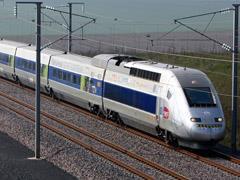
Proposals for a possible re-organisation of the French railway industry were outlined on October 9, when Haut-Rhin Sénateur Hubert Haenel presented his latest report. Well-known for his earlier study of railway regionalisation, Haenel was called in by transport minister Dominique Bussereau earlier this year.
Haenel's appointment followed the critical report by the Cour des Comptes, published in April, which condemned the current government policy as ‘dysfunctional' (RG 5.08 p287). Haenel also took account of two equally critical reports into the state of France's rail infrastructure by the Ecole Polytechnique in Lausanne, published in 2005 and 2007.
As with the auditors, Haenel is far from enthusiastic about the relationship between the state, RFF and SNCF adopted in 1997. ‘In the present context, a general reform of the system is not only desirable, as from now, it is compulsory', he believes.
The disease
Haenel's report considers three main sources of difficulty between RFF and SNCF. First is the railway's inherited assets. The sharing of buildings and other property has seen ‘10 years of controversy', with confusion blocking development. For example, he says, the question of who owns station forecourts is still not solved, and this is preventing work to improve access for disabled people.
Secondly, infrastructure maintenance is wrongly planned, badly organised and, in the end, very expensive. In spite of the 2005 Lausanne report, about half of the French network is in a very poor condition, with safety only ensured by temporary speed restrictions and extensive emergency repairs. But this impacts on train performance, and the absence of a proper renewal programme is no longer bearable. And the available funding has not been properly allocated between the various maintenance tasks.
Thirdly, the French network is under-utilised, which risks conflict with the European Union. Network capacities are underestimated by 15% to 20%, with archaic systems used to determine train paths and to control traffic. Access charges do not have a logical economical basis, and the procedures between RFF and SNCF are very complex, creating confusion for customers wishing to book paths. RFF's delegation of this responsibility to SNCF makes it difficult to guarantee fair treatment for all operators, although such transparency is a specific requirement of the European Directives.
The prescription
Haenel believes the priority is to sort out responsibility for operating the network, and he puts forward three main options.
The first would give RFF more power, by transferring the 14 400 SNCF staff who currently do this work under delegation to the infrastructure manager. The Cour des Comptes report went further, recommending the transfer of all 55 000 staff working for SNCF Infrastructure. But Haenel is aware that such a drastic change would probably not be welcomed by SNCF or RFF, and certainly would not have the agreement of the railway unions. It would increase RFF's headcount by a factor of 15 or 50, with a risk of destabilisation, and could easily lead to industrial disputes.
Option two suggests hiving off the network operation (the 14 400 staff) into a new independent company under the authority of RFF. Provisionally named ENCF (Exploitation du Réseau Ferré National), this would take over path allocation but would still leave a difficult interface between SNCF and RFF.
For Haenel, the third option is the best. All of RFF's operational responsibilities would be transferred to ENCF, including timetable planning plus SNCF's signalboxes and control rooms. This could make everything clearer, but it would be important to ensure that ENCF is really independent from SNCF. That would be less clear, as Haenel also recommends that ENCF would be a wholly-owned subsidiary of SNCF. As an example, he cites RTE-EDF-Transport, the Electricité de France subsidiary responsible for high-voltage transmission lines. If this does not satisfy the government, the second option could be chosen, with different choices for the ownership of ENCF.
What has not yet been addressed is whether SNCF staff transferred to RFF or ENCF would keep their employment rights, including salaries, free travel and SNCF health services for themselves and their families, the pension benefits having been abolished last year. Would their contracts remain, or would the transfer bring new contracts? As a precedent, many SNCF staff already work in non-railway firms, including private companies. These staff have kept their SNCF contracts and benefits, and their new employers reimburse SNCF for the cost of their services.
The financing
Haenel's last point concerns funding, suggesting that the 2006-10 renewal plan is inadequate, as demonstrated by RFF's €200m operating deficit. The state credit for refurbishing the network is undermined by the reduction in the basic state subsidy, known as the contribution to infrastructure charges, which has led to a sharp increase in access tolls.
He recommends that the state contribution to RFF should be increased by €200m per year. The report says the state is not playing its part as transport authority for main line services, nor determining the balance of traffic between different transport modes. As a result, SNCF is acting not only as the operator, but also the specifier of long-distance passenger services.
To ensure fair treatment for all rail operators in France, Haenel suggests that parliament needs to move rapidly to establish a regulatory commission for rail activities. This is the keystone of the proposed re-organisation, he says. And while discussions to ensure a sustainable future are continuing through the ‘Grenelle de l'Environnement', which was voted into law by the Assemblée Nationale on October 21, he emphasises that the state needs to define more clearly the objectives of its transport policy and accept the financial consequences of its choices.
Haenel has thus left the ball firmly in the government's court. Welcoming the report, Bussereau said he would consider its findings, but whether he seeks to implement the proposals via a decree or bring draft legislation to parliament is another matter. It may be months, or even years, before any reforms are adopted, and no doubt the current global financial crisis will not accelerate the process.















